
Owner & Attorney - Atlanta Personal Injury Law Firm
This article has been written and reviewed for legal accuracy and clarity by the team of writers and legal experts at Atlanta Personal Injury Law Firm and is as accurate as possible. This content should not be taken as legal advice from an attorney. If you would like to learn more about our owner and experienced Georgia personal injury lawyer, Nathan Whittenburg, you can do so here.
Atlanta Personal Injury Law Firm does everything possible to make sure the information in this article is up to date and accurate. If you need specific legal advice about your case, contact us. This article should not be taken as advice from an attorney.
On this page, we’ll discuss the concept of auto product liability, vehicle defects that can lead to accidents and injuries, how an experienced car accident lawyer can help with defective vehicle and product liability claims, and much more.
When you’ve been in a car accident, a negligent driver won’t always be the culprit.
Sometimes, we can attribute accidents to a vehicle defect.
Parties responsible for the defects of your car or the other driver’s car may be liable for your accident and the resulting injuries.
This is where a product liability claim comes in.
Product liability is an area of law that holds manufacturers, distributors, suppliers, and retailers responsible for injuries caused by defects in motor vehicles.
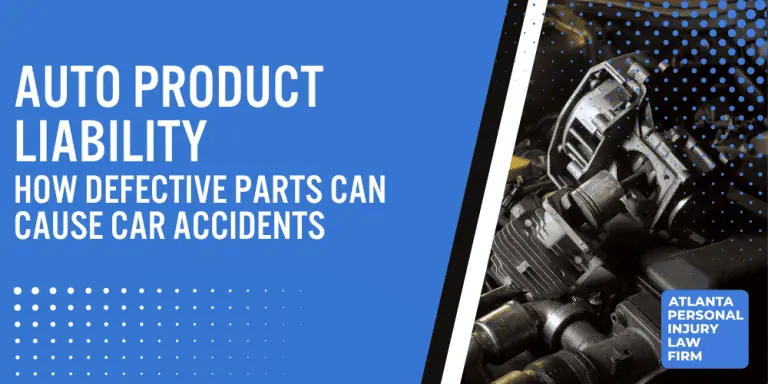
Product liability is about ensuring accountability when a faulty car part leads to an accident.
Defects in design, manufacturing, or marketing can compromise vehicle safety, putting lives at risk.
These defects not only endanger the lives of vehicle owners but also impact potential car accident claims.
If you’ve been injured in a car accident, contact the Atlanta Personal Injury Law Firm for a free consultation.
There are three types of product liability claims involving motor vehicle defects.
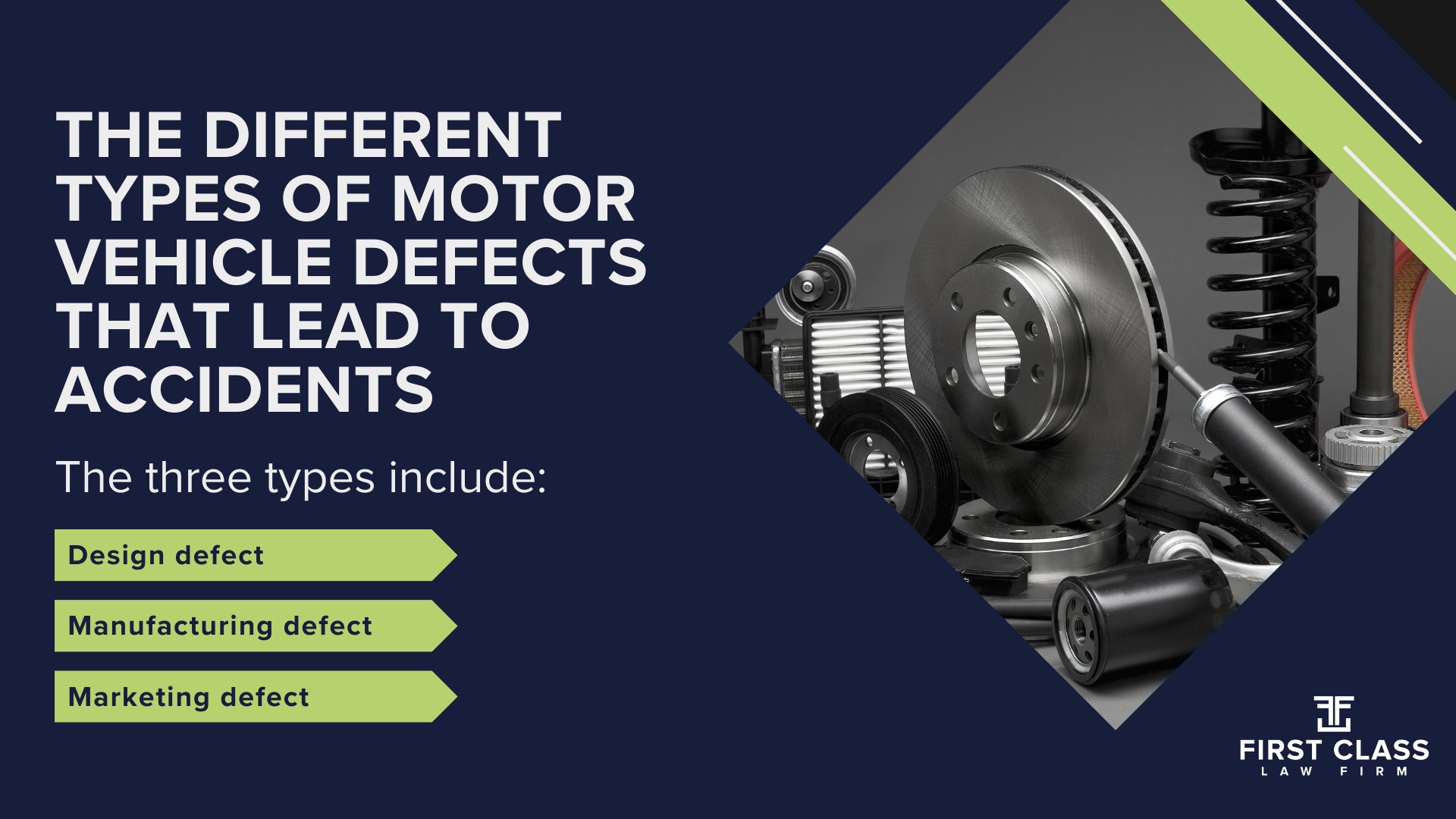
The three types include:
Design defects denote inherent flaws in the vehicle’s design, rendering it unsafe for road use.
One example of a design defect is where a car’s design makes it prone to rollovers due to its instability or an airbag system that consistently fails to deploy correctly during collisions.
Such inherent defects pose fundamental risks to drivers and passengers as these design flaws often result in severe accidents and injuries.
They represent a failure on the part of manufacturers to prioritize safety in the design phase, potentially exposing consumers to significant harm.
Manufacturing defects occur during the assembly process of the vehicle or its components.
This can involve the use of substandard materials, improper assembly practices, or errors in the manufacturing process itself.
Brake malfunctions caused by defective parts or tire blowouts due to faulty assembly can lead to devastating accidents on the road.
Manufacturing defects highlight lapses in quality control measures, where even a single oversight can have catastrophic consequences for unsuspecting motorists.
Because these defects mainly concern safety mechanisms, the National Highway Traffic Safety Administration (NHTSA) also refers to them as safety-related defects.
Marketing defects arise when motor vehicle manufacturers fail to provide adequate safety warnings or instructions to consumers.
This absence of crucial information can prevent drivers from understanding how to safely operate their vehicles or recognize potential hazards.
Without proper guidance, individuals may unknowingly put themselves and others at risk, leading to accidents and injuries.
Marketing defects underscore the importance of transparent communication between manufacturers and consumers, ensuring that safety considerations are effectively conveyed to all parties involved.
When vehicle defects go unnoticed or unaddressed, they have the potential to cause devastating accidents on the road.
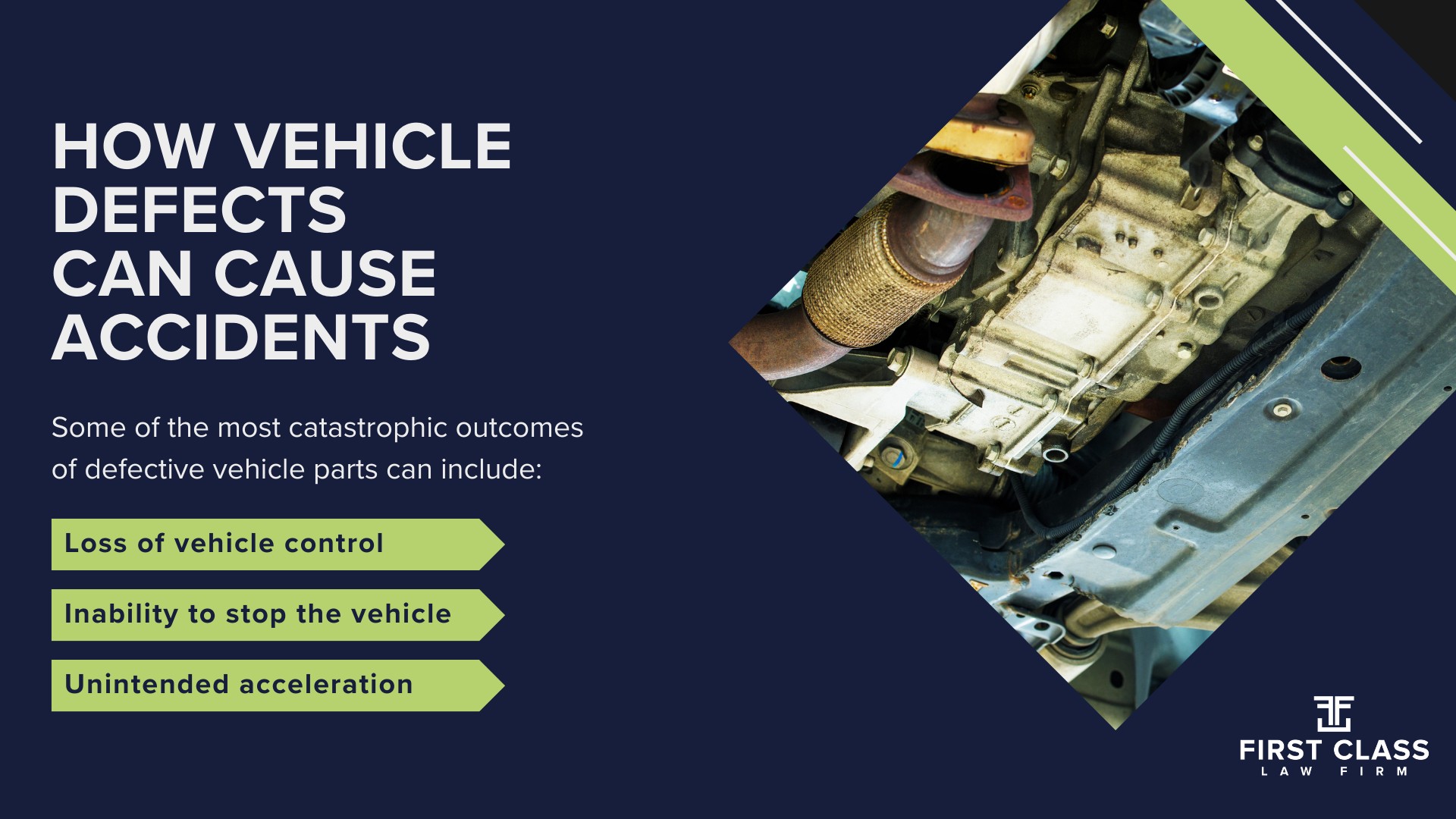
Some of the most catastrophic outcomes of defective vehicle parts can include:
Defects such as design flaws or manufacturing errors can lead to a loss of control over the vehicle.
Imagine driving on the highway when suddenly, due to a design defect, your vehicle becomes unstable and prone to rollovers.
In such situations, drivers may find themselves unable to steer or maneuver the vehicle safely, increasing the risk of collisions with other vehicles or objects on the road.
Manufacturing defects in critical components like brakes can result in an inability to stop the vehicle effectively.
Picture driving down a steep hill when suddenly, your brakes fail due to a manufacturing error.
The inability to bring the vehicle to a halt promptly can lead to rear-end collisions or collisions with pedestrians or other vehicles at intersections, resulting in serious injuries or fatalities.
Defects in electronic systems or throttle mechanisms can cause unintended acceleration, where the vehicle accelerates unexpectedly without input from the driver.
Besides electronic systems, unintended vehicle accelerations can also be due to mechanical components like faulty accelerator pedals.
This was the case in August 2019 when the Department of Transportation found several Toyota models with “sticky” accelerators.
Sudden or unintended accelerations can be particularly dangerous, especially in crowded urban areas or congested traffic conditions.
Uncontrolled acceleration can lead to high-speed collisions with other vehicles or pedestrians, causing catastrophic outcomes.
The consequences of accidents caused by vehicle defects can be severe, ranging from multi-vehicle collisions to life-altering injuries or fatalities.
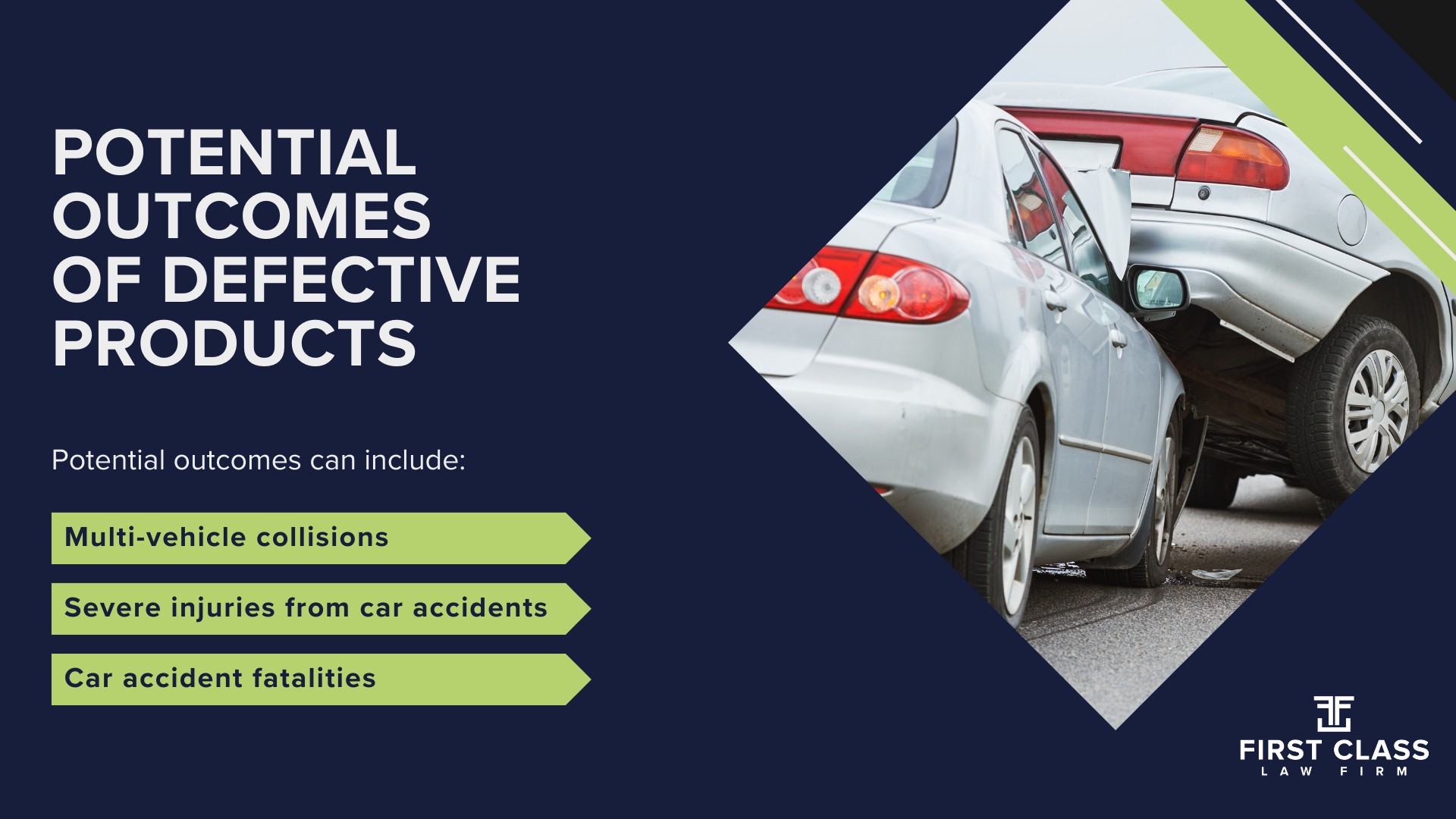
Potential outcomes can include:
Accidents caused by defective vehicle parts can lead to multi-vehicle collisions, involving multiple cars, trucks, or other vehicles.
These collisions often result in extensive property damage, severe injuries, and even fatalities.
A defective brake system may fail to stop a vehicle, causing it to collide with multiple vehicles in its path, resulting in a chain reaction of accidents.
Individuals involved in accidents caused by vehicle defects can sustain severe injuries, including traumatic brain injuries, spinal cord injuries, broken bones, and internal organ damage.
These injuries may require extensive medical treatment, rehabilitation, and long-term care.
They can dramatically impact the victim’s quality of life and ability to work or perform daily activities.
In the worst cases, accidents caused by defective vehicle parts can result in fatalities.
A defective airbag that fails to deploy during a collision may contribute to fatal head injuries or internal bleeding.
The loss of a loved one due to a preventable accident caused by auto defects can have devastating emotional and financial repercussions for surviving family members.
If you suspect that a vehicle defect caused your car accident, you can file a product liability lawsuit against negligent parties.
Identifying the parties responsible for your vehicle’s defective parts is critical to the strength of your product liability claim.
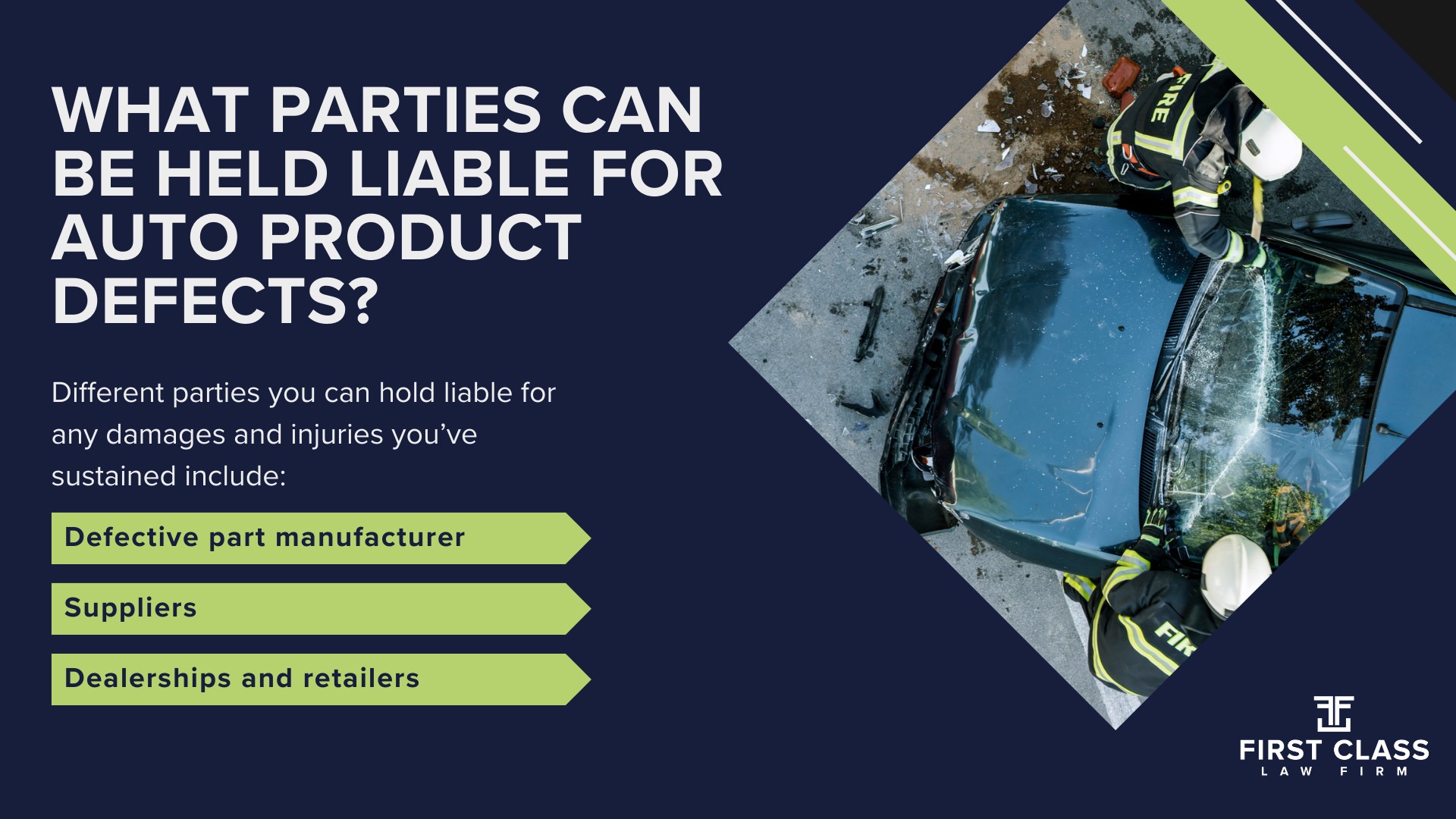
Different parties you can hold liable for any damages and injuries you’ve sustained include:
Manufacturers are at the forefront of accountability in auto product liability cases.
These are the companies responsible for designing and building the vehicle or its parts.
Whether it’s a flaw in the vehicle’s design or an error in the manufacturing process, manufacturers bear primary responsibility for ensuring the safety and quality of their products.
Suppliers play a significant role in the supply chain by providing components or parts used in the manufacturing of vehicles.
If a defect originates from a faulty component supplied by a third-party manufacturer, the supplier may also be held liable for any resulting injuries or damages.
This underscores the importance of thorough quality control measures throughout the supply chain.
Dealerships and retailers are the entities that sell vehicles to consumers.
For this reason, they may also be liable under Georgia’s product liability statutes.
While they may not be directly involved in the design or manufacturing process, they have a duty to ensure that the vehicles they sell are safe for use.
Under Section 51-1-11.1 of Georgia’s statutes, the failure to disclose known defects or recall information to consumers can result in liability for injuries or damages caused by defective vehicles.
Whether it’s due to your vehicle’s tires or an overdue recall notice, product liability cases can be tricky to pursue.
If you’re seeking a fair settlement from negligent car part manufacturers, you’ll need help.
This is where an experienced Atlanta personal injury lawyer comes in.
A personal injury attorney specializing in car accidents and product liability claims can assist you in several ways.
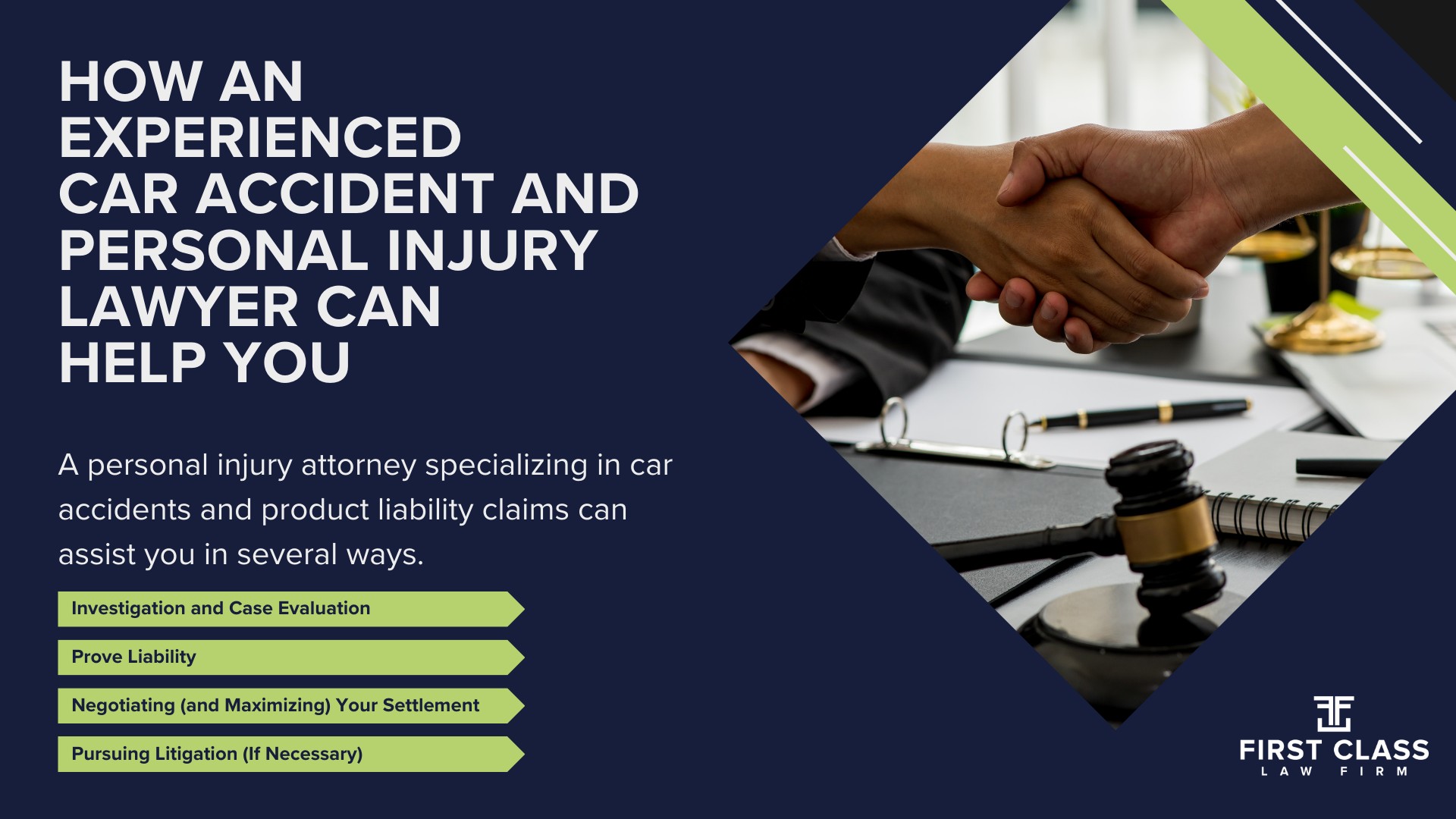
A car accident and product liability attorney begins with a case evaluation.
During the initial consultation, your attorney will discuss the specifics of your accident with you and determine your eligibility for a product liability claim.
The attorney can begin investigations to gather more evidence.
Your car accident lawyer can strengthen your claim and maximize the chances of a successful product liability lawsuit.
In product liability claims, one of the challenges is determining who’s to blame.
The expertise of a product liability attorney can make all the difference in your claim.
Your attorney will use evidence and expert testimonies to determine the defective product in your vehicle.
Your personal injury lawyer traces the defective part’s origins to establish who to hold liable.
By presenting compelling evidence and legal arguments, your attorney will demonstrate how the negligence of manufacturers, suppliers, or other parties led to the accident and your subsequent injuries.
Car accident lawyers are adept negotiators, skilled at engaging with insurance companies and opposing parties to pursue fair settlements.
Drawing upon their expertise and understanding of the law, they tirelessly advocate for your best interests, seeking maximum compensation to cover medical expenses, lost wages, pain and suffering, and other damages incurred as a result of the accident.
Settlement negotiations out-of-court won’t always bear fruit.
In instances where negotiations fail to yield a satisfactory outcome, a car accident lawyer can escalate the matter to litigation.
A product liability attorney is your staunch advocate in the courtroom, adeptly navigating the complexities of the legal process.
Through compelling arguments, persuasive presentations of evidence, and strategic maneuvering, your lawyer strives to secure a favorable verdict on your behalf.
Seeking legal counsel is not just about pursuing justice — it’s about safeguarding your future and ensuring that your voice is heard.
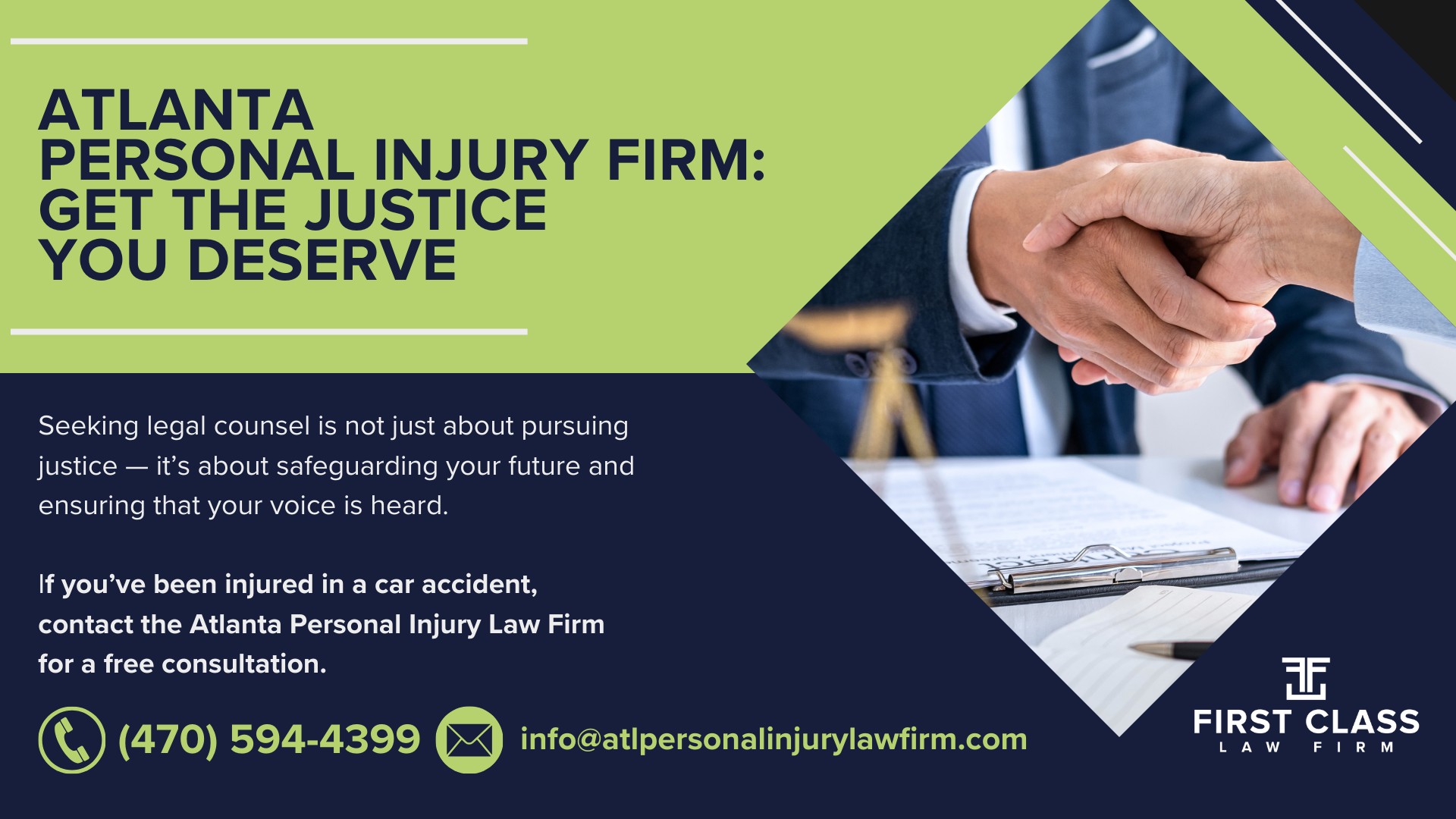
If you’ve been injured in a car accident, contact the Atlanta Personal Injury Law Firm for a free consultation.
Auto product liability refers to the legal responsibility of vehicle manufacturers, distributors, and other parties in the supply chain for injuries caused by motor vehicle defects.
If a defective part in a motor vehicle causes a car accident, the responsible parties can be held liable through product liability claims.
This legal area ensures that vehicle owners and consumers are protected from unreasonably dangerous products and can recover compensation for their injuries.
Common vehicle defects that can cause car accidents include manufacturing defects like faulty brakes, defective airbags, and malfunctioning seat belts.
Design defects, such as poorly designed gas tanks or vehicle tires prone to blowouts, also pose significant risks.
These defects can make motor vehicles unreasonably dangerous and lead to serious harm for drivers and passengers.
A product liability attorney can help by investigating the car accident to identify any vehicle defects and gather evidence to support the claim.
They will work with experts to prove that the vehicle defect caused the accident and that the manufacturer or other parties are liable.
An experienced attorney will handle the legal process, negotiate with the defendant’s insurance company, and advocate for fair compensation for the victim’s injuries and damages.
In an auto product liability case, various parties can be held liable, including the vehicle manufacturer, parts manufacturer, distributor, and dealership.
A vehicle owner can also be potentially held liable in a personal injury case.
If the vehicle defect caused the accident, each entity involved in the production and distribution of the defective product can be responsible for the resulting damages.
Proving liability often involves demonstrating that the defect was present when the vehicle left the manufacturer and that it directly caused the accident and injuries.
In a product liability claim for a car accident, victims can seek compensation for medical expenses, lost wages, pain and suffering, and property damage.
In some cases, punitive damages may also be awarded if the manufacturer’s conduct was particularly egregious.
A product liability lawsuit aims to recover compensation that addresses both the immediate and long-term impacts of the injuries caused by the defective vehicle or part.
Our firm specializes in personal injury cases across the state of Georgia, working on a contingency fee basis to ensure the best possible service for each client.
Click below to get a free, instant case evaluation and find out if you qualify for legal action immediately.
Would you like our help?
Atlanta Personal Injury Law Firm specializes in personal injury cases across Georgia, including motor vehicle accidents, premises liability, catastrophic injuries, and wrongful death claims. Our experienced Georgia injury attorney works on a contingency fee basis, ensuring you only pay legal fees once we secure your settlement or verdict.
Contact our experienced legal team by phone or visit our website for a instant case evaluation. Trust Atlanta Personal Injury Law Firm for dedicated legal representation in Georgia.
Our firm specializes in personal injury cases across the state of Georgia, working on a contingency fee basis to ensure the best possible service for each client.
Click below to get a free, instant case evaluation and find out if you qualify for legal action immediately.
Would you like our help?
Disclaimer: “Don’t Pay Unless You Win” and similar language refers only to fees charged by the attorney. Court costs and other additional expenses of legal action usually must be paid by the client. Contingent fees are not permitted in all types of cases. This website is an advertisement. Nothing is meant to be taken as legal advice or to give the impression that an attorney-client relationship has been created. Please speak with a legal professional.